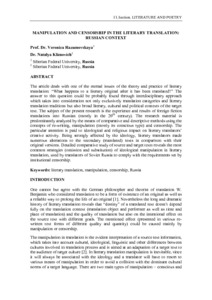Manipulation and censorship in the literary translation: Russian context
Скачать файл:
URI (для ссылок/цитирований):
https://sgemworld.at/ssgemlib/spip.php?article3954https://elib.sfu-kras.ru/handle/2311/69914
Автор:
Разумовская, Вероника Адольфовна
Климович, Наталья Викторовна
Коллективный автор:
Институт экономики, управления и природопользования
Кафедра делового иностранного языка
Дата:
2017Журнал:
4th International Multidisciplinary Scientific Conference on Social Sciences and Arts SGEM 2017. Conference ProceedingsКвартиль журнала в Web of Science:
без квартиляБиблиографическое описание:
Разумовская, Вероника Адольфовна. Manipulation and censorship in the literary translation: Russian context [Текст] / Вероника Адольфовна Разумовская, Наталья Викторовна Климович // 4th International Multidisciplinary Scientific Conference on Social Sciences and Arts SGEM 2017. Conference Proceedings: LITERATURE AND POETRY. — 2017. — Т. 6 (№ 1). — С. 207-214Текст статьи не публикуется в открытом доступе в соответствии с политикой журнала.
Аннотация:
The article deals with one of the eternal issues of the theory and practice of literary translation: “What happens to a literary original after it has been translated?” The answer to this question could be probably found through interdisciplinary approach which takes into consideration not only exclusively translation categories and literary translation traditions but also broad literary, cultural and political contexts of the target text. The subject of the present research is the experience and results of foreign fiction translations into Russian (mostly in the 20th century). The research material is predominantly analyzed by the means of comparative and descriptive methods using the concepts of re-writing, manipulation (mostly its conscious type) and censorship. The particular attention is paid to ideological and religious impact on literary translators’ creative activity. Being strongly affected by the ideology, literary translators made numerous alterations to the secondary (translated) texts in comparison with their original versions. Detailed comparative study of source and target texts reveals the most common strategies (omission and substitution) of ideological manipulation in literary translation, used by translators of Soviet Russia to comply with the requirements set by

